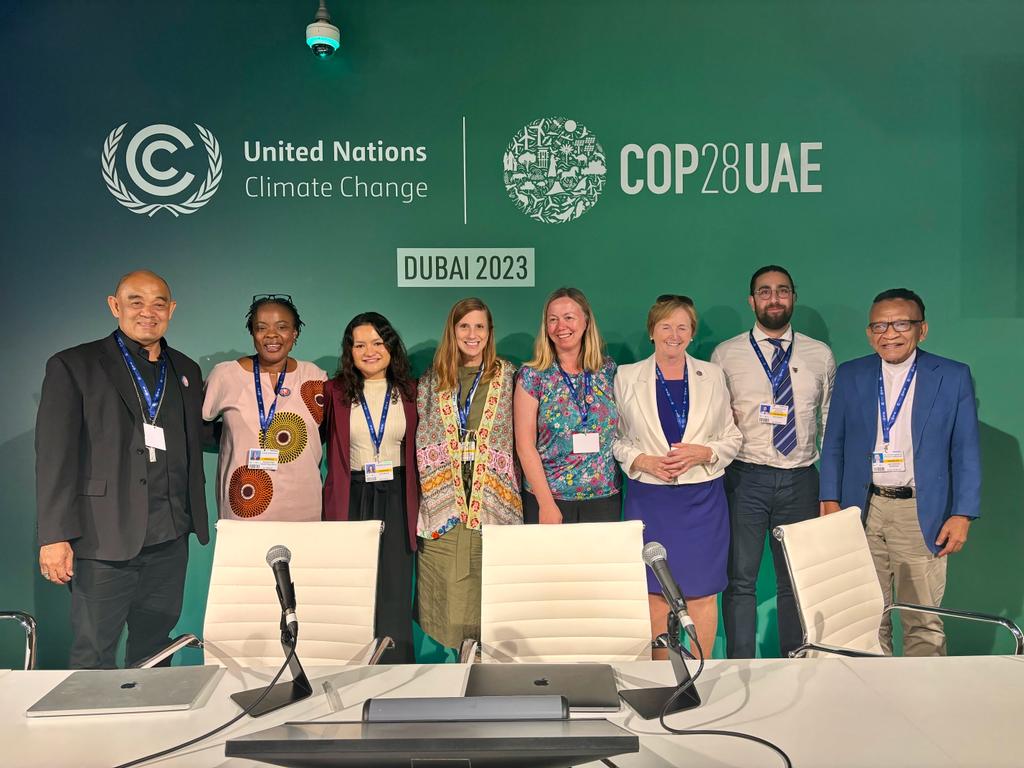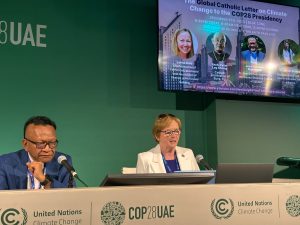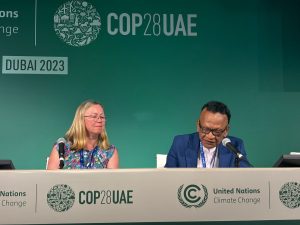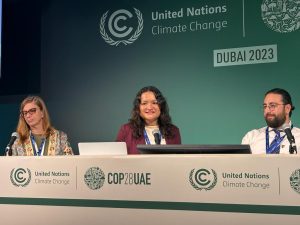
As the world anticipated the COP28 summit in Dubai, a side event titled “The Global Catholic Letter on Climate Change to the COP28 Presidency” generated not just a discussion, but also a call to action emphasizing integral ecology and demanding bold decisions from governments through the framework of seeing, judging, and acting.
The event kicked off with Lindlyn Moma, the Global Advocacy Director of Laudato Si’ Movement, setting the stage during a COP with “more fossil fuel officials than before.” Following her, Jean Quinn, the Executive Director of UNANIMA International, a nurse by profession with a passion for justice and peace, added her welcoming words and set the tone for the event:
“…for COP28 to be the most inclusive COP yet decisions, discussions and the implementation of solutions must be done in collaboration with frontline communities. Today’s event seeks to uplift those voices. ”

Jean Quinn grounds the event in the see, judge, and act framework.
To See
The opening session unfolded with a song by Archbishop Peter Chong from the Asia Pacific region. This was performed by a powerful choir with scenes of environmental devastation and renewal. Archbishop Chong accentuated these scenes with a reflection on generative power:
“How do we speak about God and vulnerability?…Vulnerability is not a weakness. It’s a form of power that invites.”
Father Jean Germain Rajoelison, Deputy Secretary General of the Symposium of Episcopal Conferences of Africa and Madagascar (SECAM), followed Archbishop Chong’s contribution by sharing SECAM’s statement for COP28:
“As Catholic communities in Africa, we ask the leaders at the 28th Conference of the Parties (COP28) of the United Nations Framework Convention on Climate Change, to recognise their moral duty and commit to urgently taking ambitious action to protect Our Common Home and the most vulnerable.”

Father Jean Germain Rajoelison reads the SECAM statement.
The end note for “seeing” was heralded via a video transmission from Mons. Lizardo Estrada Herra, the Secretary General of the Symposium of Episcopal Conferences of Latin America, declaring a pentecostal spirit for the multicultural COP28 gathering.
To Judge
Moving to the judgment phase, Lorna Gold, Chair of the Laudato Si Movement Board, delved into climate change financing and evaluated the extent to which COP27 addressed the issue, noting “there’s a lot more work to do on the disinvestment side” beyond making faith declarations.
Tzeporah Berman, International Program Director at Stand.earth, looked back on her lifetime of climate activism and condemned the false progress championed by governments and companies:
“I realized there was an incredible disconnect between climate science and policy. We know that fossil fuels are 86% of the carbon trapped today, and it comes from three things: oil, gas, and coal. Yet for the past 30 years…we have allowed fossil fuel production to grow.”
To Act
As the event shifted to a focus on action, Roy Ibrahim, the International Programme Coordinator at IYCS-JECI, discussed the concept of integral ecology as a holistic approach to understanding the environmental crisis.

Julia DeVoy, Liana Almony, and Roy Ibrahim gather to share their collective wisdom regarding actionable steps to move forward in the climate crisis.
Liana Almony, Executive Assistant at UNANIMA International, explored the intricate connection between climate change, women, gender, and displacements. She emphasized “women and girls are the creators of their own resilience. They just need the space and support to do so.”
Finally, Julia DeVoy, Ph.D., and Associate Dean of Undergraduate Students and Programs at Lynch School of Education and Human Development at Boston College, added to the conversation by highlighting the harmful impact of the fast fashion industry on the environment, especially in terms of textile waste generation. Julia DeVoy specifically mentioned:
“Pope Francis urges us to be responsible. Each year the fashion industry produces these 92 million tons of textile waste that fills landfills and contributes to environmental degradation…An enormous amount of it is shipped to the Global South where it creates incredible damage to eco-sytems, to people, to air quality, to the environment.”
Julia DeVoy recommended taking essential steps like buying fewer clothes, opting for used items, selecting non-synthetic fibers, engaging in clothes trading and swapping, and committing to supporting a compassionate and just fashion industry.
Conclusion
The grand finale saw the presentation of the Global Catholic Letter—a culmination of the collective wisdom and urgency for action. Lindlyn Moma delivered concluding remarks and bid farewell.
See the full recording of the event here:






Great article!
So happy to hear more calls to address textile waste and action on the larger scale. Incredibly needed will little time to waste.
The last quote, “These 92 million tons of textile waste that fills landfills and contributes to environmental degradation…An enormous amount of it is shipped to the Global South where it creates incredible damage to eco-sytems, to people, to air quality, to the environment,” struck a chord with me. I hope and pray that the Global Catholic Letter will kindle meaningful and impactful actions across the global communities to restore all the gifts granted by God.
It’s so hard to look at a global problem like climate change and feel like an individual has any power to change the outcome, positively or negatively. Climate change is too large for many of us to feel like we can tackle, and truthfully…it is too large for any one of us. Breaking it down into areas of human impact is a smart way to empower individuals. While I, alone, feel like I cannot reduce the 92 million tons of textile waste produced each year, I can stop buying fast fashion, repurpose old clothing, shop vintage and thrift, and hold myself responsible while purchasing new garments. In this way, I can do something and contribute to the fight against climate change, but do it in a way that allows me to hold accountable the only person I have control over…myself. This was thought provoking and I feel encourages introspection, a key aspect of living out Jesuit ideals.